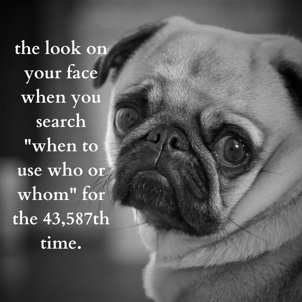A list of the top five things that tick people off includes toilet paper hung backwards (whichever way that is), the sound of people chewing loudly, and the misuse of who and whom.
If trying to decide whether to use who or whom creates a scene in your mind like the Abbott and Costello sketch “Who’s on First?”,1 fret no more. We’ve got a foolproof rule for you to nail down the correct word, every time. And we’ll explain it in a way that even people who hate grammar can appreciate and understand.
A pronoun is a word that substitutes for a noun, which is a person, place, thing, or idea. A pronoun is often used as a way to avoid repetition. When we use pronouns, we’re naming something without calling it by its name or title. Instead of saying or writing Oscar the Grouch over and over, we use he. Instead of the dog, we use it. Instead of my mother, she.
There are different types of pronouns for different things and situations.
- Subject: These are used to express action done by people or things. I ate five donuts. It fell off my desk.
- Object: If a person or thing is acted upon or receiving action, we use pronouns like him, her, them and so on. I talk to her. She sees them every Tuesday.
- Possessive: These express ownership. The duck is mine! That Tootsie Roll was his, but I ate it anyway.
- Reflexive: These are used when the person doing the action is also the recipient. I laughed at myself when I face planted. He slapped himself to stay awake.
- Demonstrative: These pronouns help us talk about specific objects. This is my car. Those are my toilet paper rolls.
There are more, but you get the drift.
And now that you’ve read that, you may forget most of it. Why? Because all we want you to remember is that pronouns are a kind of word used to name things, and there are different types of pronouns. These facts are the crux of the who versus whom issue, and they’ll help you feel less confused over why one versus the other is used.
Who is a pronoun that does things (a subjective pronoun). Whom is a pronoun that receives action—it is the object (an objective pronoun). Notice whether the who or whom in the questions/answers are doing or receiving action in these sentences:
- Who unrolled all the toilet paper? He did!
- Whom should I charge for this obscene waste of toilet paper? You should charge him!
- Who has the stinkiest feet in the house? I do.
- To whom am I speaking? You’re speaking to him, Oscar the Grouch.
So we use who in place of pronouns that do things (I/you/she/he/it/we/you/they). We use whom in place of pronouns that aren’t acting in the sentence (me/you/her/him/it/us/you/them).
The easy way to remember: If you can replace who with she/he/they or another subjective pronoun, you’re correct. If you can replace whom with him/her/them or another objective pronoun, you’re correct.
You can test this further.
For example: The last clown noses are for whom? The clown noses are for them. (If you don’t know the answer to a question, you can simply rephrase it: The last clown noses are for they? No. So we don’t use “who.”
Whom do you love? I love you. This one seems tricky since you is the same as a subjective pronoun (acting) and an objective pronoun (receiving). But look at the place of you in the sentence. Is it doing anything or just basking in all the love being dished out? The latter. So, we know that whom is correct. And just in case you weren’t sure, remember that you wouldn’t say, “You love I” or “You love she.” So you know that whom should be used.
To sum up: Start with pronoun replacements in the original sentence or the answer. Switch up the original sentence or create a bogus answer if you still need confirmation.
Drive this deep into your brain by practicing with these examples:2
- _____ ate all the boiled peanuts?
- Is this the person to _____ I am speaking? (My mom answers the phone this way for a laugh.)
- For _____ does the cat wait?
- Do you know _____ is coming?
- _____ feels better now about “who” and “whom”?

Search our blog for more bite-sized grammar lessons that will improve your confidence and your writing.
1 https://www.youtube.com/watch?v=sShMA85pv8M&t=22s
2 Answers: 1. Who 2. whom 3. whom 4. who 5. Who



